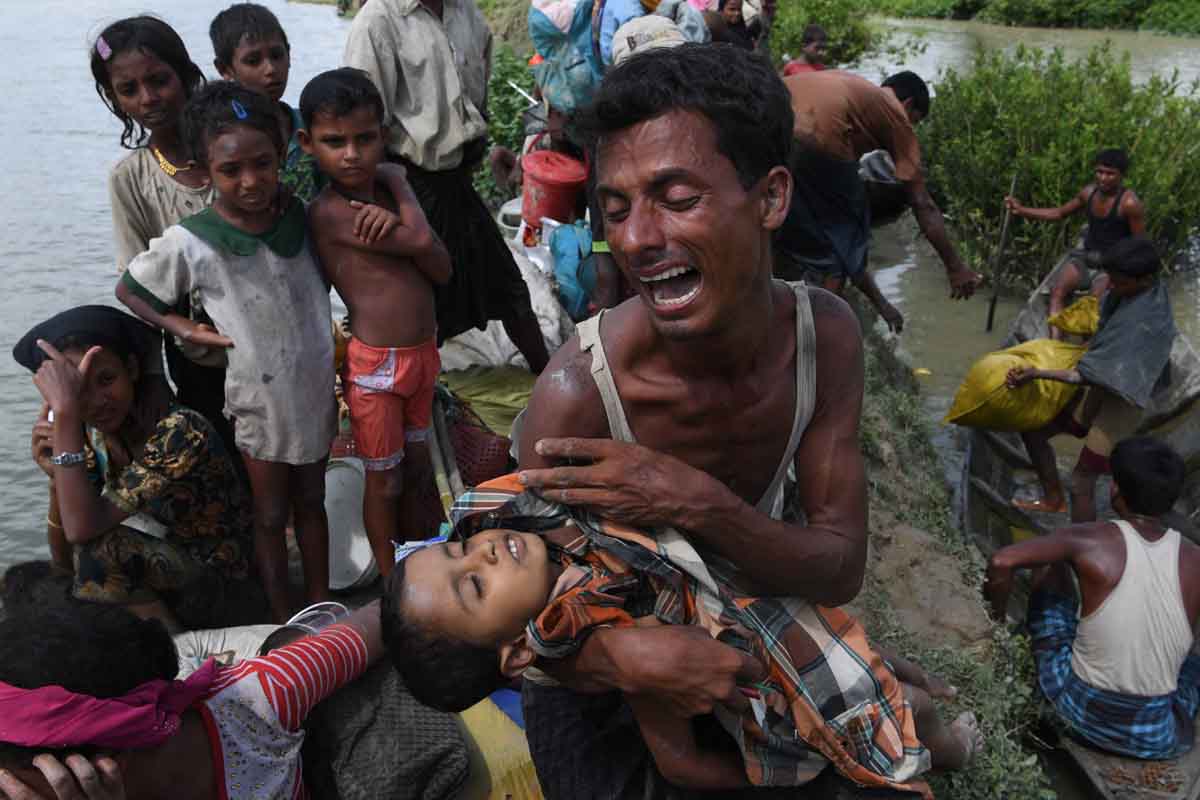Election Farce
Four years after seizing power in a coup, Myanmar’s military rulers continue their desperate yet failing bid to tighten their grip, this time by extending emergency rule under the pretext of preparing for elections.
The pre-trial chamber did not assess whether other associated war crimes may have been committed, but said they could nonetheless form part of the prosecutor’s future investigation.

File Photo (INDRANIL MUKHERJEE / AFP)
Myanmar has been dragged to court. And the international standing of the purportedly democratically elected regime has hit the reefs. There may be hope yet for the persecuted Rohingyas with the International Criminal Court (ICC) having authorised a full-scale investigation into allegations of mass persecution and crimes against humanity that forced at least 700,000 Rohingya Muslims to flee Myanmar towards neighbouring Bangladesh.
Thursday’s ruling sets a significant precedent in expanding the jurisdiction of the war crimes court; it is indeed the second move against Myanmar this week at international tribunals in The Hague. On Monday, a submission was made by Gambia to the International Court of Justice (ICJ) accusing Myanmar of genocide through the murder, rape and destruction of communities in the country’s western Rakhine state.
Advertisement
The ICC’s decision, announced on Thursday, follows a request by the court’s chief prosecutor, Fatou Bensouda, earlier this year for a formal investigation into alleged ethnic cleansing since 2016, rated by the United Nations as the worst humanitarian crisis since the Second World War. Myanmar is not a party to the Rome statute that established the ICC, but Bangladesh has accepted the court’s jurisdiction. Clearly, Myanmar’s non-membership of ICC has not influenced the decision; it is the relentless persecution of a Muslim minority segment, indeed the human factor, that has stirred the conscience of the world.
Advertisement
The ICC has extended its international lawenforcement role by declaring that it exercises jurisdiction over crimes where part of the alleged criminal conduct ~ in this case mass deportation ~ takes place on the territory of a member country. A similar argument has been presented at the ICC on behalf of Syrian refugees who have been forced to flee to neighbouring Jordan, which, like Bangladesh, is a signatory to the Rome statute. Preliminary reports suggest that the ICC is determined to get to the bottom of the matter.
The court has authorised the prosecutor to “proceed with an investigation for the alleged crimes within the ICC’s jurisdiction in the situation in the People’s Republic of Bangladesh/Republic of the Union of Myanmar”. Three judges in the ICC’s pre-trial chamber found “a reasonable basis to believe widespread and/or systematic acts of violence may have been committed that could qualify as crimes against humanity, of deportation across the Myanmar- Bangladesh border, and persecution on grounds of ethnicity and/or religion against the Rohingya population”.
The pre-trial chamber did not assess whether other associated war crimes may have been committed, but said they could nonetheless form part of the prosecutor’s future investigation. The ICC’s intervention is a significant development, sending a positive signal to the victims of atrocities in Myanmar and elsewhere. Hopefully, justice will be brought to the victims. Hopefully once more, the investigation will seek to uncover the truth and force authorities in Myanmar to realise that a country must abide by internationallyaccepted codes of conduct in relation to its peoples.
Advertisement